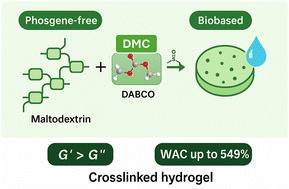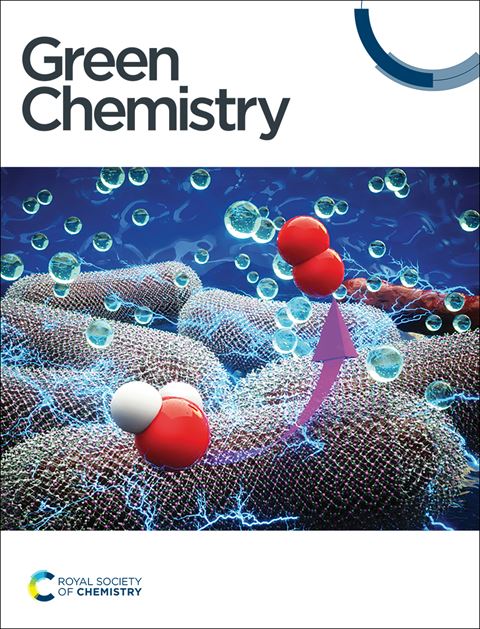绿色合成可扩展的不溶性水凝胶:用DABCO/DMSO†快速交换麦芽糖糊精与二甲基碳酸酯
IF 9.2
1区 化学
Q1 CHEMISTRY, MULTIDISCIPLINARY
引用次数: 0
摘要
本研究提出了新的合成方法和催化剂,以提高选择性和能源效率,利用可再生原料。水凝胶因其动态组成和多功能三维结构而受到重视,在控制释放系统中具有重要的前景。我们的研究重点是在绿色化学原理的指导下合成不溶于水的交联水凝胶,特别是基于麦芽糊精的聚合物。利用有机催化,特别是1,4-重氮杂环[2.2.2]辛烷和碳酸二甲酯作为环保替代品,我们展示了一种最大限度地减少废物和有害副产品的合成途径。这项工作符合绿色化学的原则,促进可持续的化学实践,同时减轻对环境的影响。本文章由计算机程序翻译,如有差异,请以英文原文为准。

Green synthesis of scalable non-soluble hydrogels: rapid transesterification of maltodextrin with dimethylcarbonate using DABCO/DMSO†
This study presents novel synthetic approaches and catalysts to improve selectivity and energy efficiency, leveraging renewable feedstocks. Hydrogels, valued for their dynamic composition and versatile three-dimensional structure, hold significant promise in controlled release systems. Our investigation focuses on the synthesis of water-insoluble crosslinked hydrogels, particularly maltodextrin-based polymers, guided by green chemistry principles. Utilizing organocatalysis, notably 1,4-diazabicyclo[2.2.2]octane, and dimethylcarbonate as environmentally friendly alternatives, we demonstrate a synthesis pathway that minimizes waste and hazardous byproducts. This work aligns with the tenets of green chemistry, promoting sustainable chemistry practices while mitigating environmental impact.
求助全文
通过发布文献求助,成功后即可免费获取论文全文。
去求助
来源期刊

Green Chemistry
化学-化学综合
CiteScore
16.10
自引率
7.10%
发文量
677
审稿时长
1.4 months
期刊介绍:
Green Chemistry is a journal that provides a unique forum for the publication of innovative research on the development of alternative green and sustainable technologies. The scope of Green Chemistry is based on the definition proposed by Anastas and Warner (Green Chemistry: Theory and Practice, P T Anastas and J C Warner, Oxford University Press, Oxford, 1998), which defines green chemistry as the utilisation of a set of principles that reduces or eliminates the use or generation of hazardous substances in the design, manufacture and application of chemical products. Green Chemistry aims to reduce the environmental impact of the chemical enterprise by developing a technology base that is inherently non-toxic to living things and the environment. The journal welcomes submissions on all aspects of research relating to this endeavor and publishes original and significant cutting-edge research that is likely to be of wide general appeal. For a work to be published, it must present a significant advance in green chemistry, including a comparison with existing methods and a demonstration of advantages over those methods.
 求助内容:
求助内容: 应助结果提醒方式:
应助结果提醒方式:


